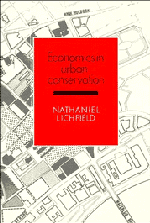Book contents
- Frontmatter
- Contents
- List of diagrams, tables and plans
- Preface
- Acknowledgements
- Introduction
- Part I Planning and management in the conservation of the urban system
- Part II Conservation of the cultural built heritage
- Part III Economics in urban conservation
- 7 Economics in the management of the built environment
- 8 Economics in the conservation of the CBH
- 9 Economics in planning for conservation of the CBH
- 10 Valuation of the cultural built heritage
- 11 Screening of the inventory or list
- 12 Who benefits and who loses from conservation of the CBH?
- Part IV Selected tools of economic analysis for project evaluation
- Part V Case studies in the economics of conservation of the CBH
- Notes
- Bibliography
- Index
12 - Who benefits and who loses from conservation of the CBH?
Published online by Cambridge University Press: 10 November 2010
- Frontmatter
- Contents
- List of diagrams, tables and plans
- Preface
- Acknowledgements
- Introduction
- Part I Planning and management in the conservation of the urban system
- Part II Conservation of the cultural built heritage
- Part III Economics in urban conservation
- 7 Economics in the management of the built environment
- 8 Economics in the conservation of the CBH
- 9 Economics in planning for conservation of the CBH
- 10 Valuation of the cultural built heritage
- 11 Screening of the inventory or list
- 12 Who benefits and who loses from conservation of the CBH?
- Part IV Selected tools of economic analysis for project evaluation
- Part V Case studies in the economics of conservation of the CBH
- Notes
- Bibliography
- Index
Summary
The issue
As brought out above (4.4–4.5) the CBH is a singular resource. While being property which is owned and managed like other real estate, government claims via ‘heritage tenure’ of its cultural quality, which it proposes to conserve for the public, contemporary and prospective, means that the owners of the property can only manage it subject to constraints. But while the cultural element is taken by government in this way, the heritage is not singular in being a public good any more than the general built environment. In both the interior of the property is clearly private (one person's consumption precludes the consumption of the same unit by another) with the exterior being public (one person's consumption does not reduce its availability to anyone else) and once the good is provided to the public gaze the producer is unable to prevent anyone from consuming it.
The responsibility for the singularity clearly falls at the door of government, acting on behalf of the community. But government does not pick up the tab for all extra costs. Their impact falls on the property owners, private or public. Here is something of an anomaly. By definition, conservation is promoted and undertaken for the benefit of a wide contemporary public, often foreign to the country in which the heritage is to be found (visitors and tourists) and also for the benefit of the future generations.
- Type
- Chapter
- Information
- Economics in Urban Conservation , pp. 201 - 216Publisher: Cambridge University PressPrint publication year: 1989



